The escalating discourse surrounding budgetary constraints in the United States government has once again cast a long shadow over international relations. Recent reports suggesting the potential closure of the US Consulate in Medan, Indonesia, attributed to efficiency-driven fiscal policies championed by the Trump administration, warrant careful examination. Such a decision, framed primarily as an economic measure, carries significant implications for both US diplomatic presence in the region and the broader bilateral relationship with Indonesia.
The rationale for closing the Medan consulate ostensibly revolves around cost savings. Consulates, while vital for consular services, economic engagement, and cultural diplomacy, represent a considerable investment. The Trump administration, known for its prioritization of domestic economic interests and streamlining governmental operations, has consistently scrutinized overseas expenditures. Reducing the number of consulates, particularly in locations perceived as less strategically vital compared to major economic and political hubs, aligns with this overarching philosophy.
However, a purely economic justification risks obscuring the broader strategic consequences. The US Consulate in Medan, located on the island of Sumatra, plays a crucial role in representing American interests in a geographically significant and economically vibrant region of Indonesia. Sumatra boasts a significant natural resource base, including oil, gas, and palm oil, and serves as a crucial trade route in the Indonesian archipelago. Its proximity to key maritime trade routes also necessitates a sustained US presence to monitor regional stability and combat transnational crime, including piracy and illegal fishing.
Closing the Medan consulate could potentially hinder US engagement in these critical areas. Reduced consular services could impede trade facilitation, potentially impacting American businesses seeking opportunities in Sumatra. Diminished diplomatic presence could also limit the US government’s ability to gather intelligence, monitor political developments, and effectively respond to emergencies affecting American citizens in the region. This could create a vacuum that other actors, seeking to increase their influence in Indonesia, might readily fill.
Furthermore, the decision carries symbolic weight, potentially impacting the overall bilateral relationship between the US and Indonesia. Indonesia, as the world’s largest Muslim-majority nation and a growing economic power, is a crucial strategic partner for the United States in Southeast Asia. Closing the Medan consulate, even if driven by economic necessity, could be interpreted as a downgrading of the importance the US places on its relationship with Indonesia, particularly with the Sumatran region. This could damage the perception of the US as a reliable and engaged partner, hindering future cooperation on a range of issues, including counter-terrorism, economic development, and maritime security.
Therefore, while the economic rationale for closing the Medan consulate may appear straightforward, a comprehensive cost-benefit analysis must account for the potential strategic drawbacks. The decision requires a nuanced understanding of the consulate’s role in promoting US interests, fostering bilateral relations, and maintaining stability in a strategically important region of Indonesia. A purely budget-driven approach risks overlooking the intangible benefits of sustained diplomatic engagement and could ultimately prove more costly in the long run, necessitating a re-evaluation of the decision-making process to ensure that economic efficiency does not come at the expense of strategic foresight. Instead of outright closure, exploring alternative cost-saving measures, such as optimizing staffing levels or streamlining operations, might offer a more balanced approach that preserves the US diplomatic presence in Medan while addressing the concerns of fiscal prudence.









